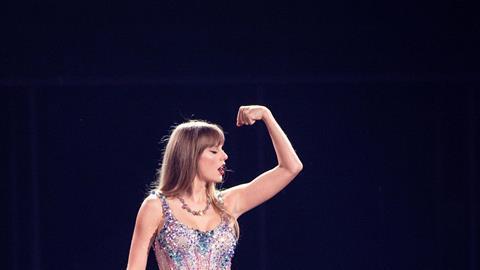Dr Belle Tindall unpacks why she believes feminism is wrong when it underplays our need for community
I’ve learned something over the past few months.
I learned it this summer, when I was surrounded by 90,000 joy-filled, sequin-clad women at Taylor Swift’s Eras tour (plus a smattering of men wearing Travis Kelce’s American football jersey. You do you, lads).
I learned it last night, when I was sat in my friend’s living room with six other women, drinking peppermint tea and discussing ways that we can make our city a safer place for us to be at night.
I learned it at this year’s Glastonbury festival, when a group of women – all perfect strangers – huddled round me to shield me from view while I tackled the women’s urinals for the first time. (Yup, you read that right. Urinals…for women.)
I learned it a few weeks ago, when I went to a work dinner. Instead of talking about anything work related with the lady I was seated next to, she told me about how she had moved in with her terminally ill best friend over lockdown so that she could care for her until the end.
The lesson I’ve learned, and am continuing to learn, through all of those experiences is this: Western, modern, secular feminism, for all of the wonderful things that it does, gets one thing very wrong. It increasingly underplays women’s need for community, particularly female community. In fact, some streams of modern feminism do more than underplay women’s need for each other, they outright reject it.
And that’s a mistake. Big mistake. Huge.
Why does feminism do this, I hear you ask?
A movement that reflects our culture
We live in an increasingly individualistic society. It’s not just feminism that’s rejecting the importance of community, it’s culture as a whole. We’re being told, in a thousand different ways, that we are supposed to be all-sufficient, free-thinking, self-determining individuals. We’re being trained in the art of being all-for-one without the burden of being one-for-all. Independence is becoming the ultimate virtue.
And it’s not all bad.
To condemn individualism completely seems to me to be too simple of a judgment; the belief that a person is responsible for their own actions underlies our entire justice system; each individual’s right to question institutions and power structures is integral, while the freedom that each person has (in theory) to pursue their own passions and convictions is a wonderful thing.
We’d do well to keep a dash of individualism in our society; a sprinkling of it, perhaps. A light dusting, at most. The problem is that we have dollops and dollops of the stuff.
And so, it’s perhaps unsurprising that it’s become a key component of feminism in recent decades. Individualist feminism kicked off in the 1960s, primarily because women wanted complete personal autonomy over their bodies and their lives. Which I totally get. But over the decades, feminism has become way too concerned with teaching women to advocate for ourselves and convincing us that success looks like going it alone.
Feminism has become way too concerned with convincing us that success looks like going it alone
According to this strand of feminism, for me to be a strong, successful and modern woman, I need to be self-sufficient and self-made. I need to be able to do it all, and make it look easy while I’m doing it. I need to win, because a win for me is a win for women everywhere. I need to be extraordinary. I need to stand out. I need to break new ground, to boldly go where no woman has gone before. I have to keep climbing, keep succeeding, keep myself together. I cannot fail. I must figure this out. I must show up for myself.
I should be able to do all of this in my own strength with no help necessary. Why? Because I am a strong, independent woman, of course. Because that’s feminism, isn’t it?
A different story
This is one of those instances where, as a Christian (first and foremost) and a feminist, a war of values rages within me. Because Christianity tells me a different story; it tells me that feminism has got this all wrong. The political, social, economic and spiritual equality of the sexes is an inherently communal endeavour. There’s nothing individualistic about it.
If I’m doing it alone, I’m doing it wrong.
What’s more, I believe that we were designed to know and be known, to love and be loved, to see and be seen. By God, first and foremost, and by each other.
Female community is, therefore, a good and heavenly thing. I think that girls exchanging homemade friendship bracelets at a Taylor Swift gig – the communal joy, catharsis and playfulness of it all – is a good and heavenly thing. I think that learning to lean on each other in our most vulnerable moments, to reject going it alone, is a good and heavenly thing. I think that actively seeking out joy, softness and silliness amid each other is, you guessed it, a good and heavenly thing.
We were made to feel an affinity with each other, to need and enjoy each other, and that’s something that feminism needs to remember.



































No comments yet